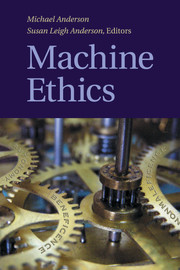Book contents
- Frontmatter
- Contents
- General Introduction
- PART I THE NATURE OF MACHINE ETHICS
- PART II THE IMPORTANCE OF MACHINE ETHICS
- Introduction
- 4 Why Machine Ethics?
- 5 Authenticity in the Age of Digital Companions
- PART III ISSUES CONCERNING MACHINE ETHICS
- PART IV APPROACHES TO MACHINE ETHICS
- PART V VISIONS FOR MACHINE ETHICS
- References
4 - Why Machine Ethics?
from PART II - THE IMPORTANCE OF MACHINE ETHICS
Published online by Cambridge University Press: 01 June 2011
- Frontmatter
- Contents
- General Introduction
- PART I THE NATURE OF MACHINE ETHICS
- PART II THE IMPORTANCE OF MACHINE ETHICS
- Introduction
- 4 Why Machine Ethics?
- 5 Authenticity in the Age of Digital Companions
- PART III ISSUES CONCERNING MACHINE ETHICS
- PART IV APPROACHES TO MACHINE ETHICS
- PART V VISIONS FOR MACHINE ETHICS
- References
Summary
A runaway trolley is approaching a fork in the tracks. if the trolley runs on its current track, it will kill a work crew of five. If the driver steers the train down the other branch, the trolley will kill a lone worker. If you were driving the trolley, what would you do? What would a computer or robot do? Trolley cases, first introduced by philosopher Philippa Foot in 1967[1] and now a staple of introductory ethics courses, have multiplied in the past four decades. What if it's a bystander, rather than the driver, who has the power to switch the trolley's course? What if preventing the five deaths requires pushing another spectator off a bridge onto the tracks? These variants evoke different intuitive responses.
Given the advent of modern “driverless” train systems, which are now common at airports and are beginning to appear in more complicated rail networks such as the London Underground and the Paris and Copenhagen metro systems, could trolley cases be one of the first frontiers for machine ethics? Machine ethics (also known as machine morality, artificial morality, or computational ethics) is an emerging field that seeks to implement moral decision-making faculties in computers and robots. Is it too soon to be broaching this topic? We don't think so.
Information
- Type
- Chapter
- Information
- Machine Ethics , pp. 51 - 61Publisher: Cambridge University PressPrint publication year: 2011
References
Accessibility standard: Unknown
Why this information is here
This section outlines the accessibility features of this content - including support for screen readers, full keyboard navigation and high-contrast display options. This may not be relevant for you.Accessibility Information
- 13
- Cited by
